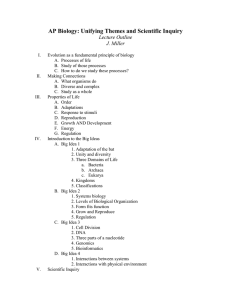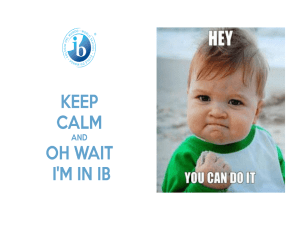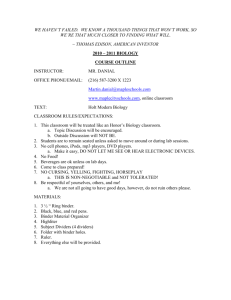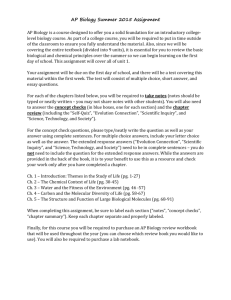B 105 D C
advertisement
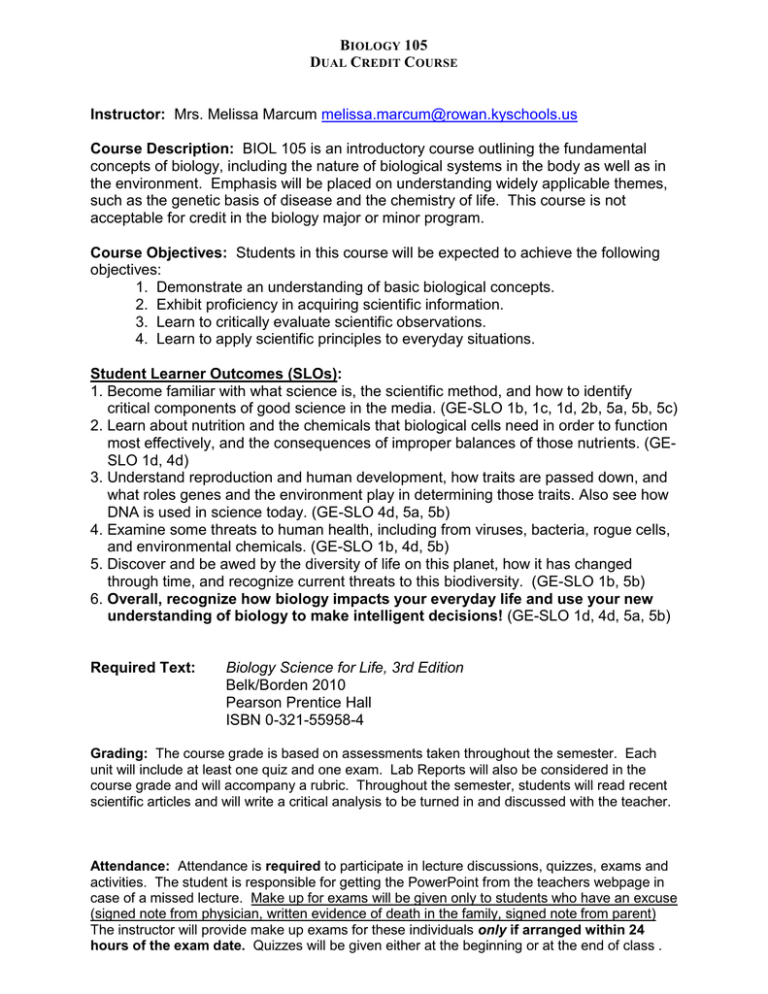
BIOLOGY 105 DUAL CREDIT COURSE Instructor: Mrs. Melissa Marcum melissa.marcum@rowan.kyschools.us Course Description: BIOL 105 is an introductory course outlining the fundamental concepts of biology, including the nature of biological systems in the body as well as in the environment. Emphasis will be placed on understanding widely applicable themes, such as the genetic basis of disease and the chemistry of life. This course is not acceptable for credit in the biology major or minor program. Course Objectives: Students in this course will be expected to achieve the following objectives: 1. Demonstrate an understanding of basic biological concepts. 2. Exhibit proficiency in acquiring scientific information. 3. Learn to critically evaluate scientific observations. 4. Learn to apply scientific principles to everyday situations. Student Learner Outcomes (SLOs): 1. Become familiar with what science is, the scientific method, and how to identify critical components of good science in the media. (GE-SLO 1b, 1c, 1d, 2b, 5a, 5b, 5c) 2. Learn about nutrition and the chemicals that biological cells need in order to function most effectively, and the consequences of improper balances of those nutrients. (GESLO 1d, 4d) 3. Understand reproduction and human development, how traits are passed down, and what roles genes and the environment play in determining those traits. Also see how DNA is used in science today. (GE-SLO 4d, 5a, 5b) 4. Examine some threats to human health, including from viruses, bacteria, rogue cells, and environmental chemicals. (GE-SLO 1b, 4d, 5b) 5. Discover and be awed by the diversity of life on this planet, how it has changed through time, and recognize current threats to this biodiversity. (GE-SLO 1b, 5b) 6. Overall, recognize how biology impacts your everyday life and use your new understanding of biology to make intelligent decisions! (GE-SLO 1d, 4d, 5a, 5b) Required Text: Biology Science for Life, 3rd Edition Belk/Borden 2010 Pearson Prentice Hall ISBN 0-321-55958-4 Grading: The course grade is based on assessments taken throughout the semester. Each unit will include at least one quiz and one exam. Lab Reports will also be considered in the course grade and will accompany a rubric. Throughout the semester, students will read recent scientific articles and will write a critical analysis to be turned in and discussed with the teacher. Attendance: Attendance is required to participate in lecture discussions, quizzes, exams and activities. The student is responsible for getting the PowerPoint from the teachers webpage in case of a missed lecture. Make up for exams will be given only to students who have an excuse (signed note from physician, written evidence of death in the family, signed note from parent) The instructor will provide make up exams for these individuals only if arranged within 24 hours of the exam date. Quizzes will be given either at the beginning or at the end of class . Class policies: Once you have entered the classroom, please turn cell phones off. Also, no laptops will be allowed, my PowerPoint’s will be accessible on my teacher webpage. Academic Dishonesty: Plagiarism or cheating in any form will not be tolerated and will be dealt with in accordance Appendix A of the student handbook and the University Undergraduate Catalog. Academic dishonesty, as defined by the University, occurs when you do not do your own work, fail to give credit for the work of others, or use resources inappropriately. Diversity issues: This course addresses the diversity of biological organisms. Human diversity is addressed in the context of inheritance and disease. Kentucky's New Teacher's Standards: Biology 105 will offer a constructive, flexible learning environment in which students will gain content knowledge in the area of Biology. Students will be encouraged to participate as active learners through question and answer sessions at the beginning of each class meeting and questioning throughout the lecture. A writing assignment will be used to strengthen communication skills. Higher order thinking skills will be necessary for success on written exams. The effectiveness of instruction and learning will be assessed through student exams and quizzes. Class Lecture and Exam Schedule: Dates and Topics to be Covered Week Topics 1-2 Nature of Science; Water, Biochemistry, Cells 3 3-4 5 6 7 8 9 9-10 11-12 Nutrients, Enzymes and metabolism, Cell Transport Photosynthesis & Cell Respiration, Plant Biology Cancer and the Cell Cycle Genetics Gene Expression and GMO’s Evolution and Natural Selection Biodiversity and Classification Ecology Animal Structure & Function Reinforcement Activities Bellwork/Exit Slip Venn Diagram Concept Map Pair Share Discussion Double Entry Organizer Interactive Word Wall Frayer Model Graffiti Conversation Paired Verbal Fluency Activities Model Building Lab Food Label Lab Cell Size & Surface Area Lab Gummi Bear Inquiry Lab Chapter 1,2 Photosynthesis Inquiry Lab Cell Respiration Lab 4, 22, 23 Dose Response Curve Lab The Truth About Cancer Video Genetic Variation of Hand Sizes Activity Pedigree Analysis Gene Expression Simulation 5 The Mating Game (On line Activity on Evolution website) 9,10 Classification Lab 12 Pond Studies Inquiry Lab Population Growth Lab Predator Prey Activity Pig Dissection 13-15 3 6,7 8 16-21 General Education Student Learner Outcomes BIOL105 is designated a Natural Science I (NSCI) General Education course, and as such, addresses the following General Education Student Learner Outcomes: 1. Communication Skills Students will demonstrate ability to: 1b. Read college-level critical, creative and technical texts for comprehension 1c. Write effectively for a variety of target audiences using conventions associated with standard English 1d. Convey quantitative and qualitative relationships using symbols, equations, graphs, and tables 2. Intellectual Skills Students will demonstrate ability to: 2b. Recognize and effectively utilize both deductive and inductive reasoning 4. Knowledge of Human Cultures Students will demonstrate ability to: 4d. Comprehend the cycle of human growth necessary to provide sustained health and individual well-being 5. Knowledge of the Natural World Students will demonstrate ability to: 5a. Comprehend and apply basic scientific, quantitative, and technological methods and knowledge of natural systems to the solution of scientific problems 5b. Employ scientific methods and theories to analyze and address open and debated questions in the sciences 5c. Analyze explanations to classify them as scientific or nonscientific
